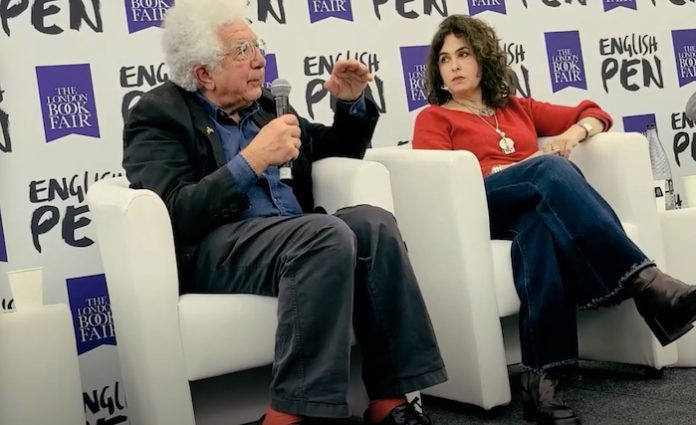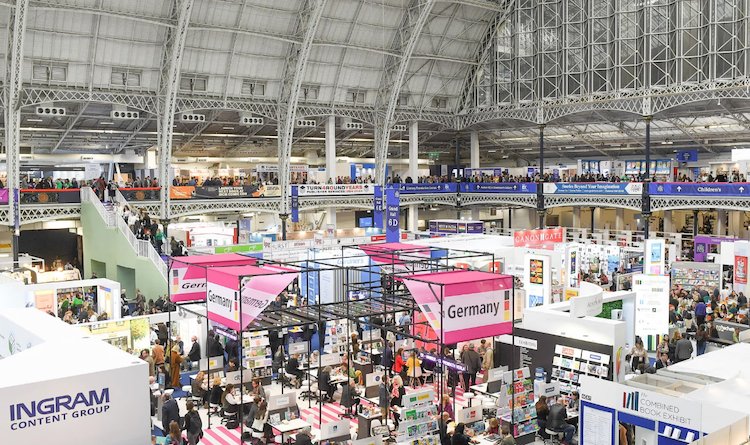
The 2024 London Book Fair returned this year at the iconic Olympia with its famous barrel-vaulted roof and magnificent cast-iron galleries. The fair had been moved to 12 to 14 March, after initially being scheduled for 16 to 18 April. The change was prompted by the Bologna Children’s Book Fair announcing its dates for 8 to 11 April, just a few days before the original LBF dates, which would have been a problem for those attending both fairs.
With 1029 exhibitors and close to 30,000 trade visitors, LBF 2024 regained its usual pre-pandemic levels, even though the Olympia’s ongoing renovation (only to be completed in 2026) resulted in notable space compression. Hosting numerous book presentations as well as discussions on AI, free speech and the precarious position of creatives, this year’s fair, (according to some – “more controversial than ever”), in many ways reflected the topics debated in what some consider the ‘public space.’ In particular concerning the situation in Gaza and the US’s upcoming presidential elections.

Exhibitors from India were also back in business with around 35 booths, including NBT’s collective stand. Unfortunately, and unlike previous years, LBF’s country statistics this year provided numbers not according to where exhibitors are headquartered but based on their markets. Out of the 180-some exhibitors from Asia-Pacific, 56 were based or selling in India, 56 in mainland China, 42 in Japan, 36 in Hong Kong, 36 in South Korea, 35 in Singapore, 29 in Malaysia, 28 in Taiwan, 26 in Thailand, 24 in Vietnam, 23 in the Philippines, 20 in Indonesia, several companies in Nepal, Pakistan, Bangladesh, Cambodia, Myanmar, Mongolia, and 67 in Australia, New Zealand and the Pacific islands.
India’s multilingual opportunity
One of the panel discussions held on the first day of the fair, “Dynamics of India’s Multilingual Market,” explored the intricacies and opportunities of India’s multilingual publishing market. The panel included Yuvraj Malik, NBT’s managing director; Aditi Maheshwari, CEO of the Vani Prakashan Group; Prashant Pathak, director of Publishing Operations at Prakash Books; and, Ajay Mago, publisher at Om Books. The discussion centered around the impact of India’s new National Education Policy 2020 and its emphasis on multilingualism. From the rise of Indian languages to the potential for global collaborations, the panel tried to analyse the dynamic forces shaping India’s diverse publishing industry and provide insights to international publishers interested in collaborative ventures.
English Pen seminars – Palestine, free expression
Also on the first day, Book Workers for a Free Palestine held a vigil in front of the entrance, “to mark the death of Palestinian writers, poets, academics and journalists killed by Israel,” as Penguin publishing director Ailah Ahmed explained. The English PEN ran two seminars on ‘Palestine, Israel, and Free Expression in the UK,’ featuring authors Selma Dabbagh, Isabella Hammad, Rafeef Ziadah, Palestine Festival of Literature producer Yasmin El-Rifae, Oxford University professor of International Relations Avi Shlaim, and the vice president of the British Society of Middle Eastern Studies Professor Neve Gordon. The discussion focused on the cancellation of multiple events that were to include Palestinian artists over the past six months.
Iraqi-Jewish Professor Shlaim said that the UK had a longstanding issue with “freedom of expression” when it comes to Israel and Palestine. “The climate of opinion favours Israel and British Jews, and it’s very hostile to Palestinians and Muslims.” He also criticised the International Holocaust Remembrance Alliance’s definition of anti-semitism, which is largely supported by UK institutions as being “weaponised in order to silence free speech on Israel.”
But also at LBF 2024, Profile Books acquired the rights to publish What Does Israel Fear from Palestine? by Raja Shehadeh. In the book, Palestinian lawyer and founder of the human rights organization Al-Haq Shehadah, explores the opportunities for peace that were rejected by Israel since its formation in 1948.
Writers against the war on Gaza
In the meantime, more than 3,000 writers, editors, and Hollywood celebrities have joined forces to express their solidarity with the Palestinian people in a letter responding to the ongoing conflict. Taking their inspiration from the 1960s’ American Writers Against the Vietnam War, they formed an impromptu international coalition, Writers Against the War on Gaza, supported by high-profile names such as Susan Sarandon, Gael García Bernal, Jia Tolentino, Ocean Vuong, Valeria Luiselli, Cathy Park Hong, Hannah Black, Ari Brostoff, Kyle Dacuyan and others from diverse publications and institutions. The authors recognise that while their words alone cannot halt the devastation in Gaza, they intend “to challenge and rectify the distortions and misrepresentations in the media. The coalition strongly condemns those in their field who they believe perpetuate apartheid and genocide narratives.”
The next LBF is to take place from 11 to 13 March 2025.















